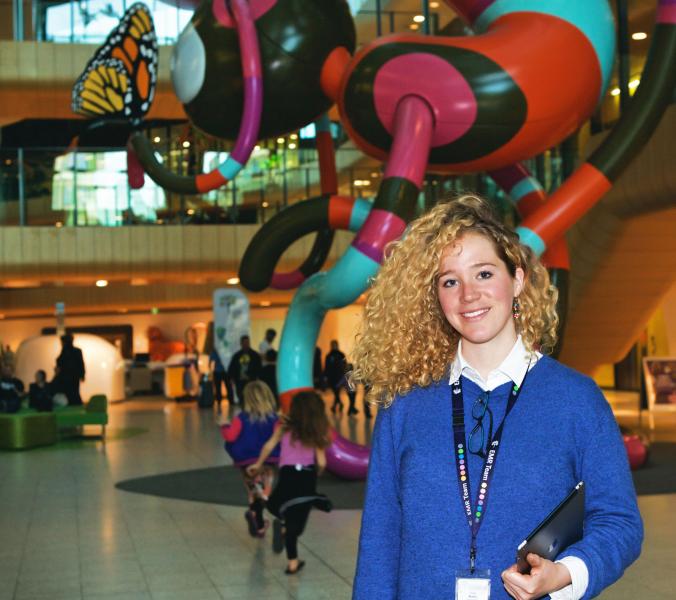Co-ops give health info sciences grad a competitive edge
Human and Social Development, Co-op
- Kate Hildebrandt

For Emily Mailes of Melbourne, Australia, deciding what to study was a daunting process. “I was not one of those people who always knew what they wanted to do.”
Six years post-high school and having relocated to Victoria, Emily decided to pick a path and move forward with her life. “UVic’s School of Health Information Sciences stood out,” she says. A relative is a grad who now has an interesting and lucrative career. The global opportunities across the tech sector held considerable appeal along with the school’s promise of guaranteed placement upon graduation.
The School of Health Information Sciences (HINF), based in Human and Social Development, was the first program of its kind when launched in 1981. Today, it’s internationally recognized as a leader in the field of health informatics education.
“I was fascinated, too, by the diversity of the BSc program,” Mailes explains. Studies blend computer programming with healthcare delivery and business administration skills to prepare students for the demands of the health service workplace as well as equipping them with the ability to push the discipline forward.
Encouraged to work while she learned, Mailes arranged her own work terms through contacts she had established with Stanford Children’s Health in Palo Alto, California, KPMG Australia’s Melbourne office, and the Royal Children’s Hospital (also in Melbourne) where she works now as a full-time electronic medical record analyst.
During her work term at Royal Children’s, she helped put together a business case for an electronic medical record software installation. This involved literature reviews, workflow analysis, time-in-motion studies, and developing business requirements. The case was so successful, she was hired to work on the project. In fact, the same software she used during her work term at Stanford Children’s Hospital was procured by Royal Children’s. Emily’s co-op experience gave her an advantage having worked closely with this program that had yet to be tried in Australia.
Recalling highlights from her time at UVic, Mailes says she’s changed her mind about one instructor who refused to give her an extension or a break on grading after a team abandoned their group project. The instructor’s direction to figure out how to manage the team or do the work herself led Mailes to complete the assignment. “I wasn’t happy with that prof then, but now I really appreciate that experience.”
Mailes also recalls one class that was held entirely outdoors. “I pine for Victoria,” she admits. “I wish I’d realized then just how fortunate I was to attend a university nestled in the forest and a stone’s throw from the beach; to be around people who are progressive and accepting and ambitious; to live in a city where activities like cycling, kayaking, hiking, and rock-climbing are so accessible.”
Being able to study a few electives online meant she could complete her international co-ops, line up employment, do some travelling (like cycling from Victoria to her work placement in California), and still graduate on time.
With feet now firmly planted in Australia, Emily has found a way to give back to the program that helped her get her life on track. She’s gearing up to place a HINF co-op student this September alongside at the Royal Children’s Hospital. Not only will she be the student’s main support person, they’ll also be included in work with different teams and project managers.
“I’m really excited to be able to offer this co-op to a fellow HINF student,” she says, stressing how much she values the learning she gained through similar experiences. “I think this will be a fantastic opportunity.”

